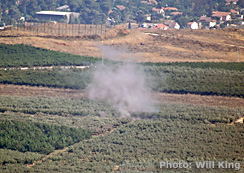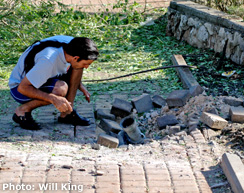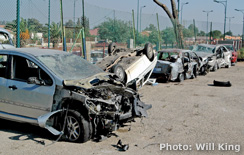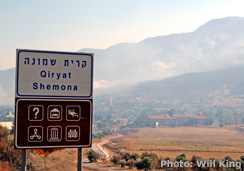They knew I would be back
Tuesday, November 14th, 2006 by SandraShalom from Jerusalem. It is so good to be in Israel!
The Fall tour group has gone—as has Berg Production—leaving me to discover Israel on my own again. It is quiet and I am enjoying a few hours of getting into the hum of daily life.
The 60 or so pilgrims who made their way to Israel with us were rewarded with a new insight on the Bible and their faith. It was wonderful to watch as they came to understand the power of this land and the God they serve. Our head guide, Zvi, had us up and going at 6:30 am each day, finishing about 5 pm. I can honestly say that we saw Israel from Dan to Beersheba.
The weather had been exceptional, except for one day of rain when we were headed to the Old City. It was one of the few times I could actually get up to the Western Wall without having to push my way through all the other women. The rain had kept most away. Still it was a special time to see the Wall and to pray.
I like to ask the pilgrims what their favorite site is and hear what they have to say. Most agreed that the Yeshua (Jesus) boat ride on the Sea of Galilee was their favorite. I must confess that it is one of my favorite sites also. The boat has music playing as we leave the dock and head out to the middle of the Galilee. It is really a time of praise and worship.
Once we are in the middle of the lake, the seamen raise the American flag and play our national anthem. While sitting there on the Galilee and hearing the words, “home of the brave and land of the free” really takes on new meaning.
Then HaTikva, the Israel national anthem, is played. It too, really makes my heart swell. Both countries have made so many sacrifices for freedom. Hearing Amazing Grace sung in Hebrew takes on a whole new meaning also.
Really, a good group of people. I am looking forward to the Spring tour already!
Berg Productions was here to do filming for Zola Levitt Presents. Jeff did filming on the new series about Daniel. We also filmed two year-end programs in Jerusalem overlooking the city. The weathermen had predicted rain, but the day turned out beautiful. Looking back over the past year was hard for me. We both did some interviews which I think everyone will find very timely and interesting.
I am staying at the same Bed and Breakfast I have stayed at in the past. When I walked in to the reception area, I was greeted with a “welcome home.” They had even made sure I had hot water for a shower. I really was touched by their kindness. Breakfast the next morning was just as it was when I was here in July. Boiled eggs, tomatoes, red peppers, cucumbers, lots of fresh bread, and for me, lots of coffee. I went for my morning paper to the same little store. Routine—I love it. I reached down and got my bottle of water and had to laugh that nothing had changed and the water was where I had left it.
Yes, I made my trek to the laundry. Believe or not, they remembered that I was Will’s ema (mother). They just laughed at my small amount of laundry. Later that afternoon, I picked it up and was told that I had gotten a discount because he knew I would be back.
I am resting and getting caught up on emails and such. But, it is good to be here in the land I love so much.
Pray for the Peace of Jerusalem,
Blessings,
Sandra


 I began with a tour of the Naftali hills, which rise above Kiryat Shemona. These hills separate Israel and Lebanon, and many rockets that landed short of Kiryat Shemona sparked fires on these hills. The smoke and ash would pour down the hills, covering the town and valley below. Now that the guns have silenced and the fires all been put out, the full extent of the damage became visible. Much of the hillside is now black and grey. If the trees haven’t been totally destroyed, then they are brownish in color, as if it were autumn.
I began with a tour of the Naftali hills, which rise above Kiryat Shemona. These hills separate Israel and Lebanon, and many rockets that landed short of Kiryat Shemona sparked fires on these hills. The smoke and ash would pour down the hills, covering the town and valley below. Now that the guns have silenced and the fires all been put out, the full extent of the damage became visible. Much of the hillside is now black and grey. If the trees haven’t been totally destroyed, then they are brownish in color, as if it were autumn. Down below in the Hula Valley, much of the same. On one side of a road just south of Kiryat Shemona, the trees are all still green, untouched by the fires. On the other side, a Katusha rocket had landed and sparked a fire, burning everything in its path up until the road. Everywhere the smell of fire still remained in the air. In some places the ground was covered with a soft layer of ash that would circulate about as I walked through the area.
Down below in the Hula Valley, much of the same. On one side of a road just south of Kiryat Shemona, the trees are all still green, untouched by the fires. On the other side, a Katusha rocket had landed and sparked a fire, burning everything in its path up until the road. Everywhere the smell of fire still remained in the air. In some places the ground was covered with a soft layer of ash that would circulate about as I walked through the area. The Hizbullah intentionally targeted Israeli civilian populations, and whenever they missed often had the added “advantage” of burning forests and fields of crops. It is doubtful that any of this was seen on the news programs. Instead, they chose to focus on the suffering of the poor Lebanese people from the “war crimes” committed by the cruel Israelis. It is amazing that how no matter what the situation or the circumstances, the world media and the UN can find a way to blame Israel for it.
The Hizbullah intentionally targeted Israeli civilian populations, and whenever they missed often had the added “advantage” of burning forests and fields of crops. It is doubtful that any of this was seen on the news programs. Instead, they chose to focus on the suffering of the poor Lebanese people from the “war crimes” committed by the cruel Israelis. It is amazing that how no matter what the situation or the circumstances, the world media and the UN can find a way to blame Israel for it. I traveled to the north again today as part of a Bridges for Peace mission to deliver food and supplies to needy families there. Passing us on our way north were several tanks on flatbed trucks heading south. Our first stop was to Kiryat Shemona, where some 800 rockets fell over the course of the fighting with the Hezbollah. Several homes have minor damage, such as windows shattered and shutters blown apart, from where the rockets had missed the buildings but still caused damage from the shock of the impact. Again, when weighed against the number of rockets fired at the city, there were thankfully very few direct hits against homes. However, we examined an apartment building that had sustained a direct hit on Saturday, just before the cease-fire went in to effect.
I traveled to the north again today as part of a Bridges for Peace mission to deliver food and supplies to needy families there. Passing us on our way north were several tanks on flatbed trucks heading south. Our first stop was to Kiryat Shemona, where some 800 rockets fell over the course of the fighting with the Hezbollah. Several homes have minor damage, such as windows shattered and shutters blown apart, from where the rockets had missed the buildings but still caused damage from the shock of the impact. Again, when weighed against the number of rockets fired at the city, there were thankfully very few direct hits against homes. However, we examined an apartment building that had sustained a direct hit on Saturday, just before the cease-fire went in to effect. We went to our target neighborhood where students and several poor families were living. Less than 10 minutes after we opened the doors to the truck almost all the food and supplies were gone. One neighbor would tell their neighbor, they knew best who around them was in the most need. I talked with a 14 year old girl who came to get some food from us. She and her mother stayed in their apartment throughout the war, suffering the impact of Katusha rockets around them, the constant boom of Israeli artillery firing into Lebanon, and the smoke and ash that filled the air. All the residents were so very grateful to receive this food, and thanked us many time over, even after we told them that it came from Christians.
We went to our target neighborhood where students and several poor families were living. Less than 10 minutes after we opened the doors to the truck almost all the food and supplies were gone. One neighbor would tell their neighbor, they knew best who around them was in the most need. I talked with a 14 year old girl who came to get some food from us. She and her mother stayed in their apartment throughout the war, suffering the impact of Katusha rockets around them, the constant boom of Israeli artillery firing into Lebanon, and the smoke and ash that filled the air. All the residents were so very grateful to receive this food, and thanked us many time over, even after we told them that it came from Christians. While in the neighborhood we toured their communal bomb shelter. It was located between several apartment buildings, and a Katusha had landed only 3 meters away from it! The steep stairs led down about two stories underground to a set of heavy steel doors. Inside the room were bunk beds, a modest shower and bathroom, and not much else. It was very hot a stuffy inside, and could only be worse when filled with people. The children had drawn several pictures and placed them on the walls, as well as painting several designs directly on to the walls. Their efforts brightened the place had helped somewhat, but it was still very sad that children had to spend so much time in such a place as that.
While in the neighborhood we toured their communal bomb shelter. It was located between several apartment buildings, and a Katusha had landed only 3 meters away from it! The steep stairs led down about two stories underground to a set of heavy steel doors. Inside the room were bunk beds, a modest shower and bathroom, and not much else. It was very hot a stuffy inside, and could only be worse when filled with people. The children had drawn several pictures and placed them on the walls, as well as painting several designs directly on to the walls. Their efforts brightened the place had helped somewhat, but it was still very sad that children had to spend so much time in such a place as that. We later saw where the tanks had moved to after they left from Lebanon. They were staged in an open area, close enough to the border to respond quickly enough if called upon.
We later saw where the tanks had moved to after they left from Lebanon. They were staged in an open area, close enough to the border to respond quickly enough if called upon. Next we headed west along the road known as the Northern Highway. This highway runs generally straight from just south of Kiryat Shemona to Rosh Hanikra on the coast, many times right along the border with Lebanon. It was from there where I finally entered into an area where the artillery was set-up and was allowed to film. The guns had now fallen silent, and the commander had no problem letting us take pictures and talk with his soldiers. They were tired, having worked very hard around the clock during the fighting.
Next we headed west along the road known as the Northern Highway. This highway runs generally straight from just south of Kiryat Shemona to Rosh Hanikra on the coast, many times right along the border with Lebanon. It was from there where I finally entered into an area where the artillery was set-up and was allowed to film. The guns had now fallen silent, and the commander had no problem letting us take pictures and talk with his soldiers. They were tired, having worked very hard around the clock during the fighting. A Katusha had hit and collapsed the front part of a home, and pieces of the rocket were everywhere. Fortunately, nobody was hurt. As I take pictures another alarm sends the crowd of reporters, police, and locals that had gathered there scrambling for cover. Afterward, I talk with one resident there who says that he has a brother in Dallas.
A Katusha had hit and collapsed the front part of a home, and pieces of the rocket were everywhere. Fortunately, nobody was hurt. As I take pictures another alarm sends the crowd of reporters, police, and locals that had gathered there scrambling for cover. Afterward, I talk with one resident there who says that he has a brother in Dallas. The sound of the Israeli artillery firing back into Lebanon booms throughout the city, and I decide to go find them. After some driving I do find their location, but again I’m told no photos. I decide to move on to Metula and see what’s going on there.
The sound of the Israeli artillery firing back into Lebanon booms throughout the city, and I decide to go find them. After some driving I do find their location, but again I’m told no photos. I decide to move on to Metula and see what’s going on there. On the way there I encounter a mortar platoon setting up and preparing to fire. I get out and take several pictures of the troops in action. This is what I had been waiting for. I’m close enough to hear the commander giving out orders: their target in one strike was a gas station.
On the way there I encounter a mortar platoon setting up and preparing to fire. I get out and take several pictures of the troops in action. This is what I had been waiting for. I’m close enough to hear the commander giving out orders: their target in one strike was a gas station. After the mortars, I climb the hill above Kiryat Shemona, right on the border, near to where I had been with my mom in a previous adventure at kibbutz Misgav Am. There’s an amazing view into Lebanon, and I can see smoke coming from several villages in the distance, probably from the Israeli artillery and mortars. As I drive a little further I see the Fox News van, so I stop. It’s their correspondent Mike Tobin and crew. I watch them for just a little bit, and between their live broadcasts make sure to tell them what a good job they are doing with their coverage of everything. He tells me that he has a house in Dallas, but that he hasn’t ever been there—always away on assignment.
After the mortars, I climb the hill above Kiryat Shemona, right on the border, near to where I had been with my mom in a previous adventure at kibbutz Misgav Am. There’s an amazing view into Lebanon, and I can see smoke coming from several villages in the distance, probably from the Israeli artillery and mortars. As I drive a little further I see the Fox News van, so I stop. It’s their correspondent Mike Tobin and crew. I watch them for just a little bit, and between their live broadcasts make sure to tell them what a good job they are doing with their coverage of everything. He tells me that he has a house in Dallas, but that he hasn’t ever been there—always away on assignment. Back to the bunker in Kiryat Shemona, and the mayor is meeting with former defense minister Shaul Mofaz. In the city there is one convenience store open. Only 15 meters away is a hole in the road from where a Katusha had landed some days ago. I make sure to buy a drink from them for the road, and wish them the best of luck.
Back to the bunker in Kiryat Shemona, and the mayor is meeting with former defense minister Shaul Mofaz. In the city there is one convenience store open. Only 15 meters away is a hole in the road from where a Katusha had landed some days ago. I make sure to buy a drink from them for the road, and wish them the best of luck. We kept our attention and cameras focused in the direction of Kiryat Shemona, and in about 20 minutes witnessed 2 rocket barrages against the city. There were also other rockets that missed and landed in open areas in the valley, causing no damage. There were also many rockets that landed short of the city, sparking fires along the hills above Kiryat Shemona. After the second round of rockets we left Metulla for Kiryat Shemona to see what damage had been caused.
We kept our attention and cameras focused in the direction of Kiryat Shemona, and in about 20 minutes witnessed 2 rocket barrages against the city. There were also other rockets that missed and landed in open areas in the valley, causing no damage. There were also many rockets that landed short of the city, sparking fires along the hills above Kiryat Shemona. After the second round of rockets we left Metulla for Kiryat Shemona to see what damage had been caused. In the town my friend took me to a spot where a rocket had fallen just the day before. Only 30 meters from an apartment building a Katusha had landed on a basketball court just under a goal, nearly scoring 2 points. Several cars parked nearby had been damaged, one overturned completely, from the force of the impact. As I take pictures some residents inform us about another rocket that had landed nearby only 15 minutes before.
In the town my friend took me to a spot where a rocket had fallen just the day before. Only 30 meters from an apartment building a Katusha had landed on a basketball court just under a goal, nearly scoring 2 points. Several cars parked nearby had been damaged, one overturned completely, from the force of the impact. As I take pictures some residents inform us about another rocket that had landed nearby only 15 minutes before. We arrive there and find a familiar sight in Kiryat Shemona: the rocket had again landed near an apartment building, but not on it. Windows were shattered and some shrapnel thrown into the side of the building, but nobody hurt. I saw this repeatedly while driving around the city, holes in the roads or courtyards of apartment buildings, but the buildings and residents themselves had been spared. Just a couple of days ago they said on the radio that out of the more than 3,000 rockets that the Hizbullah has fired, only 5% have been direct hits on homes or other buildings—God’s hand protecting His people.
We arrive there and find a familiar sight in Kiryat Shemona: the rocket had again landed near an apartment building, but not on it. Windows were shattered and some shrapnel thrown into the side of the building, but nobody hurt. I saw this repeatedly while driving around the city, holes in the roads or courtyards of apartment buildings, but the buildings and residents themselves had been spared. Just a couple of days ago they said on the radio that out of the more than 3,000 rockets that the Hizbullah has fired, only 5% have been direct hits on homes or other buildings—God’s hand protecting His people. That’s not to say that there’s no damage caused by the misses. Kiryat Shemona was largely abandoned, with evidence of Katusha strikes everywhere: glass on the streets, unfilled holes from the impacts, smoke from the fires burning on the hills, and ash falling like snow. The smoke was at times so thick that it was like twilight at mid-afternoon.
That’s not to say that there’s no damage caused by the misses. Kiryat Shemona was largely abandoned, with evidence of Katusha strikes everywhere: glass on the streets, unfilled holes from the impacts, smoke from the fires burning on the hills, and ash falling like snow. The smoke was at times so thick that it was like twilight at mid-afternoon. Subscribe:
Subscribe: